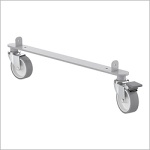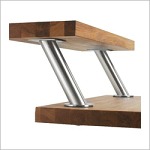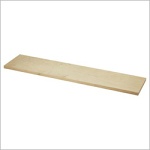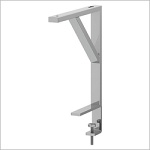I'm not pulling any punches here. Why? Because I think most people who are looking for a job need a dose of reality instead of 'good thoughts' and 'quick tricks'.
Here are Rich Gee's 10 Commandments Of Looking For A Job:
1. It's going to be HARD.
You will push yourself farther than you've ever pushed yourself before — into areas that are uncomfortable — networking, connecting, selling, negotiation, schmoozing, etc. Get used to it.
WHY? Most job-seekers are afraid of the process. They want the limo to pull up to their house and whisk them off to their next position. Guess what? It's NEVER going to happen.
2. You must work 30-40 hours a week on your search.
It's a job to find a job. Any less is just fooling around. You have to put serious time into your search — if you don't you will just prolong your unemployment — turning it from a 3-6 month process to a 12-18 month ordeal. I have my clients do a simple math equation: Take your yearly salary and divide it by 12. That is how much you are costing your family for each month unemployed. Stop focusing on your severance package — go out and find a job!
WHY? Clients that dive into their search and spend a reasonable amount of time (30-40 hours a week), get a job. It's that simple.
3. Stop the whining.
Okay, you lost your job — get on with life. Stop navel-gazing and blaming yourself.
WHY? I encounter a number of clients who are wounded and use their loss as an excuse to bypass the difficult actions of a job search. If you are so damaged, it's time for you to seek help with a therapist. If not, get off your ass and move on. You're an adult and you have bills to pay and mouths to feed. Stop the pity party.
I hate to be blunt here — but you're an adult with responsibilities — get out there and make things happen!
4. Don't focus on your résumé every 5 seconds.
Get it done, keep it concise and powerful (and well-written). If you need help — spend the money and have it written for you. You can modify it for certain positions, but don't obsess about what other people say.
WHY? People get so attached to their résumé. They ask every friend and recruiter for advice and guess what? They tell them it stinks and that they have to totally modify it. Get it done and get it out. Stop looking for distractions.
5. Get out and meet people.
If you stay in all day and surf the web, that's not looking for work. It's vacation. To find that perfect position, you must be visible and expose yourself to A LOT of people.
WHY? It's a very simple equation: If you meet new people, you will make new opportunities, you will connect with hiring managers, you will be introduced to hidden positions, you will be offered a job. On the other hand, if you don't meet new people, less opportunities, less hiring manager interaction, less position options, and less job offers. It's that simple.
Hit the library. Make friends with the librarians — they can help you find information on organizations, industries, and people not found on the web. And it's fun — they start rooting for you to find that next position AND it gets you out of the house. One suggestion — try the smaller local libraries — they tend to focus on the serious researcher and not have a 'get em in/get em out' attitude to the masses.
6. Make yourself extremely marketable.
Hit the gym everyday. Eat well. Get an up-to-date haircut. Get new glasses. Dress in style and dress up every day. Act as if you are going out on a first date — first impressions are SO important.
WHY? Be Your Best — you are selling a product . . . YOU. You have to polish it until it shines and catches the light. Any less and you might be passed over for a single errant, inconsequential reason that you could easily fix. Take a few dollars and improve your wardrobe, your body, and your look. You want to hit them hard when they first see you.
7. Study your industry and market.
Don't sit around and surf. Immerse yourself where you're looking for a job. Learn what has happened, what is happening, and begin to predict what will happen. So many job-seekers look for positions but neglect to fully understand what's happening in their industry. When you have a job, you live in a bubble. Take the time and seriously dive into what is happening out in the world. It will come in handy during interviews.
WHY? People forget that this time is for you to apply and work for a BETTER company.
8. Pick companies you would LOVE to work for.
I get so much grief for this one. When looking for a job, so many people give in and make themselves like a company/position rather than targeting organizations they would kill to work for.
WHY? It's easier to find open positions than to LOVE a company, target key individuals, and build your own position.
9. Learn how to interview, ask questions, and negotiate.
Don't wing it. You need to practice and get out there and interview. The more you hone your image, your patter, your answers, your body language, your questions, and your negotiation skills, the faster you will land that primo position.
WHY? So many applicants feel they can rely on their strengths and forget when they're in tense situations, their weaknesses start to show. You need to be 'buttoned-up', secure, and ready for anything a key interviewer throws your way.
10. Be Positive, Smile, and Watch Your Body Language.
This is a big one. Get up every day and start out by rewarding yourself with a motivation.
HOW? Work out, listen to music, do yoga, read, meditate . . . anything. You have to begin each day with a positive mindset. Too many job seekers hit the snooze alarm or get indexed into multiple family responsibilities (not that it's a bad thing) in the morning. Make sure you have time for yourself. Get up early (I get up at 4-4:30 every morning) and make time for yourself — stop staying up late and watching reruns of The Mentalist. Go to bed early (I hit my pillow at 9:30 PM) and get in some real sleep time.
Smile! Stop frowning at everything — remind yourself frequently to smile with people, on the phone, and in unexpected situations. You'll find it brings up the good juices within and you actually feel more positive.
Take an proactive stance on your body language. Walk 20% faster (catch any Bourne Identity movie - watch how Matt Damon walks) - it livens up your system and tells everyone you mean business. Lean forward when you speak and use your hands — it engages the listener and shows them you are passionate about what you do.
11. Surprise! Extra Credit.
Focus on four areas. What are they?
1. Job Boards/Company Sites - This is the easiest area to attack and the most frustrating area to encounter. There might be jobs here, but most of the time, it's a major time-suck for higher level positions. But don't discount it — do it — but don't hold yourself back — access all four areas.
2. Recruiters - Reach out to them, but don't expect a lot to happen. They are focused on obtaining the best employed candidates, poaching from the competition, and keeping their retainers healthy and growing. There might be a perfect alignment of your need and their deliverable, but it rarely happens. I'm not down on recruiting, just don't put all your eggs in this basket. And don't get frustrated when they don't return your calls — it's the nature of the beast.
3. Connecting/Networking - As I said before, a good bet is to reach out to strategic friends, family, and colleagues who might connect you to the right people. You need to move up the food chain and play tennis with the big boys and girls. Don't make all your stops with unemployed networking groups — you're trying to sell a car when everyone else in the room are selling cars too. You need to mix with accomplished, employed, and upwardly mobile people who GET IT. You've hit a road bump in your career (we all have), stop holding yourself back and reach for the gold ring.
4. Targeting - You need to pick the best companies that you would LOVE to work for (remember this?). Act like a private investigator — research what's going on, who's making headlines, where they're going, and who you need to target. Then build a dossier about that person — where they went to school, what do they do, where they worked, are they on social media, etc. Then go after them and introduce yourself to them. Now the hard part begins.
I know this has been a rough post to read — but my goal isn't to sugar-coat my coaching, but to tell the truth and get you to take action ASAP. Let me know if you found it useful.







